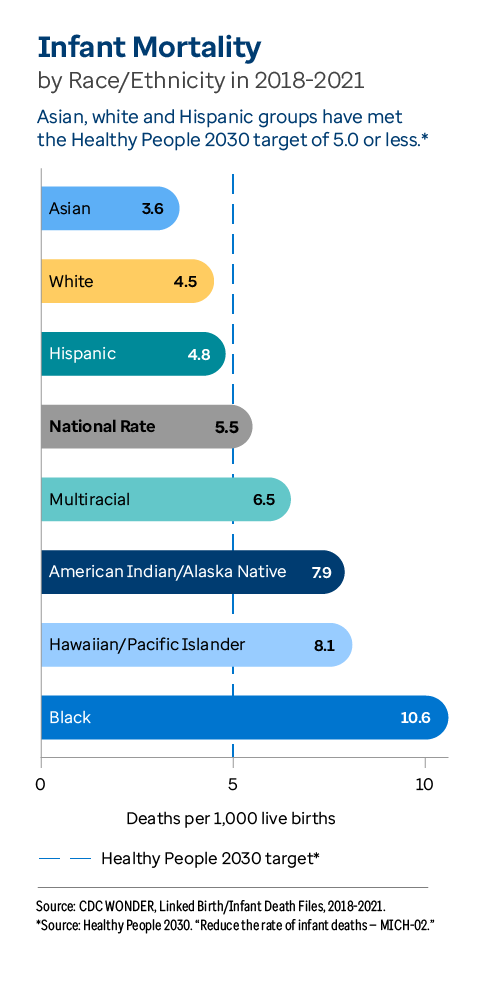Healthy women and children are the foundation of communities across the country; understanding the disparities they face is critical.
The America’s Health Rankings® 2024 Maternal and Infant Health Disparities Data Brief, released by the United Health Foundation, sheds light on the breadth, depth and persistence of disparities, outcomes and drivers of health for the approximately 61 million women of reproductive age (18-44) and 4 million infants in the United States.
This new analysis builds on the 2023 Health of Women and Children Report by analyzing up to five years of data to offer a more detailed look into disparities by race/ethnicity, education and income across 14 measures of maternal and infant health — both at the national level and through State Profiles that offer a localized understanding of where action is needed to address disparities.
Read the latest brief
America’s Health Rankings, produced by the United Health Foundation, provides an analysis of the health of various populations, including women and children, on a national and state-by-state basis. Policymakers, health officials and researchers use these reports to better understand the specific health concerns and areas that are thriving in their communities.



Persistent disparities by race/ethnicity and socioeconomic status
The brief details disparities at the national and state levels by race/ethnicity, education and income in measures of health outcomes and drivers of health. For example:
- In 2020, severe maternal morbidity was 2.0 times higher among Black mothers (139.0 per 10,000) than white mothers (69.9) and 1.5 times higher among Black mothers than Hispanic mothers (94.6).
- Infant mortality was 2.9 times higher among infants born to Black mothers (10.6 per 1,000) than Asian mothers (3.6), 2.4 times higher than white mothers (4.5) and 2.2 times higher than Hispanic mothers (4.8) in 2018-2021.
- Among females ages 18-44, between 2010-2014 and 2018-2022, uninsured rates were 5.8 times higher among those with less than a high school education (28.4%) than college graduates (4.9%).
“Leveraging public health data and insights is vital to identifying and prioritizing the most critical health challenges to maternal and infant health. The America’s Health Rankings platform helps us in addressing chronic conditions, reducing health disparities and promoting preventive care, ensuring our efforts are targeted, evidence-based and impactful. Only through united, determined action can we effectively tackle and ensure a healthier future for all.”
Dr. Lisa S. | National Medical Director of Maternal Child Health, UnitedHealthcare
The Maternal and Infant Health Disparities Data Brief also includes measurements related to public health goals and benchmarks like Healthy People 2030. Managed by the U.S. Department of Health and Human Services’ Office of Disease Prevention and Health Promotion, Healthy People 2030's specific, measurable, data-driven objectives highlight critical national health priorities to be achieved by the year 2030.
Spotlight on solutions

To help address maternal health disparities in New York, the United Health Foundation and CAMBA announced a three-year, $3 million grant partnership in 2020 to increase access to prenatal care for underserved and homeless individuals in Brooklyn. Through the partnership, more than 475 pregnant people have received a care management plan, 430 individuals received education about family health topics and 24% were connected to doulas or midwives. Learn more
The UnitedHealthcare Catalyst™ program, in partnership with the Samuel U. Rodgers Health Center and Northland Health Care Access in Kansas City, Missouri, is focused on addressing maternal and infant health disparities. From 2020-2023, the program reports a 52% increase in postpartum care engagement and a 66% reduction in low-birth weight prevalence. Read more
For more than 30 years, UnitedHealth Group has used findings from America’s Health Rankings reports, along with additional data and insights from the organization’s team members, to devise and deliver targeted, meaningful solutions that address America’s health disparities — in health care, insurance, clinical expertise and financial support. UnitedHealth Group partners with national and local organizations, government agencies, experts and lawmakers to further improve and better target these solutions, and help all people live healthier lives.
About the United Health Foundation
Through collaboration with community partners, grants and outreach efforts, the United Health Foundation works to improve our health system, build a diverse and dynamic health workforce and enhance the well-being of local communities. The United Health Foundation was established by UnitedHealth Group in 1999 as a not-for-profit, private foundation dedicated to improving health and health care. To date, the United Health Foundation has committed nearly $800 million to programs and communities around the world, including a $100 million commitment to help diversify the health workforce. To learn more, visit UnitedHealthFoundation.org.
Share This Story